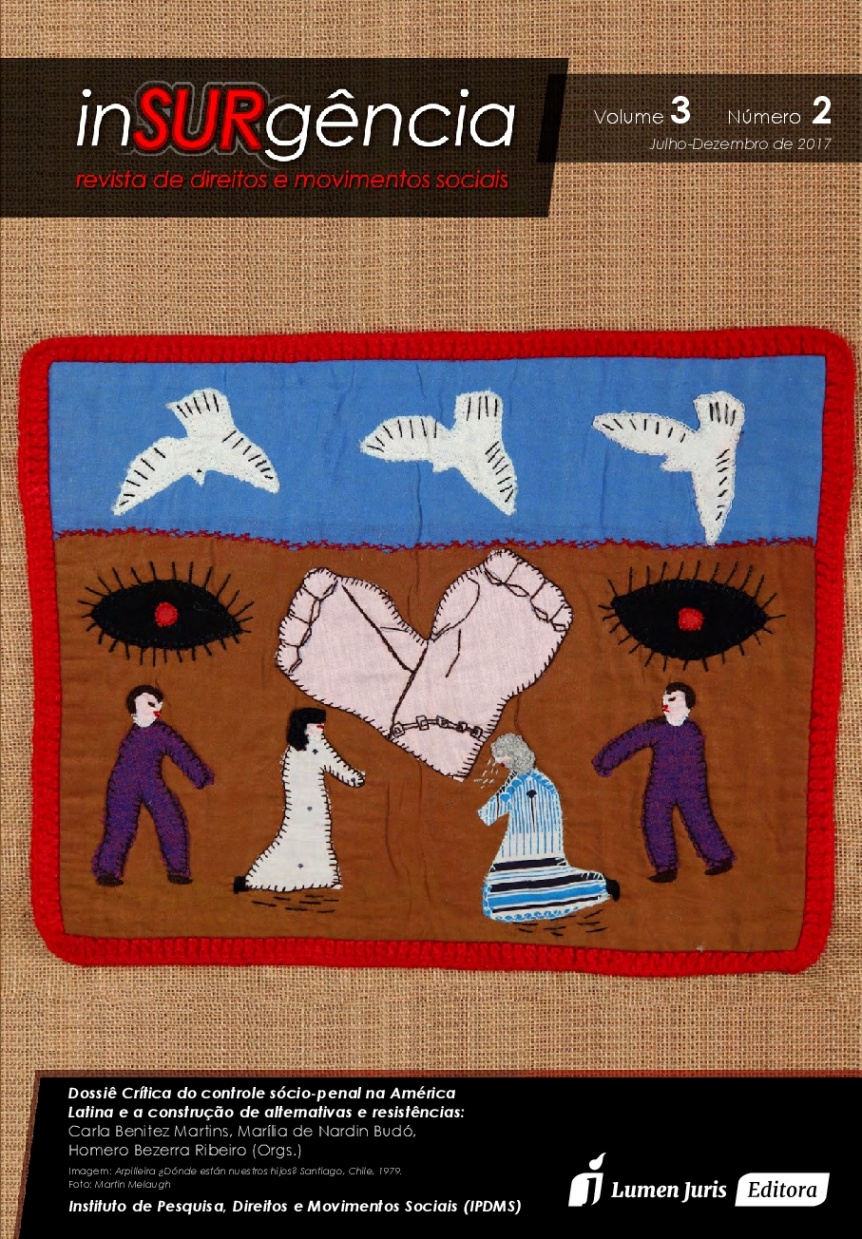Empresas transnacionais, violações de direitos humanos e violência estrutural na América Latina
um enfoque criminológico
DOI:
https://doi.org/10.26512/insurgncia.v3i2.19722Keywords:
Transnational corporations. Human rights violations. Criminological approach. Latin American.Abstract
In Latin America, business activities by transnational corporations
are often closely related to human rights violations. These serious human rights violations may vary in nature; furthermore, they are often a direct or indirect result of legal and economic international policies and a direct or indirect cause of violence and insecurity at the national level. This paper explores the contexts in which human rights violations by transnational corporations occur. Three hypotheses guide the analysis of the impact of transnational economic policies and businesses as a cause for structural and visible violence. These hypotheses will be illustrated through three model cases from Chile, Ecuador and Brazil. Furthermore, the potential of criminological concepts to explain transnational criminogenic conditions will be discussed.
References
BOEKHOUT VAN SOLINGE, Tim; KUIJPERS, Karlijn. The Amazon Rainforest. A green criminological perspective. In: SOUTH, Nigel; BRISMAN, Avi (Ed.). Routledge International Handbook of Green Criminology. London/NY: Routledge, 2013. p. 199-213.
BÖHM, María Laura. Empresas transnacionales y violación de Derechos Humanos en América Latina - Dificultades para su imputación y juzgamiento. Boletín Semestral GLIPGö, n. 4, pp. 11-24, 2012.
______. Los crímenes de Estado, la complicidad civil y el sistema punitivo. In: En Letra. Derecho Penal, Buenos Aires, año 1, n. 1, pp. 8-18, 2015.
______. Political violence, International Crimes, and Transnational Corporations in Latin America. In: HE, Bingsong; LIU, Yanping (Ed.). New Philosophy of Crime and Punishment in the Era of Globalization. Beijing: Beijing University, 2011, p. 344-360.
______. Políticas de Seguridad y Neoliberalismo. In: A. Fernández Steinko (Ed.). Delincuencia, Finanzas y Globalización. Madrid: Centro de Investigaciones Sociológicas, 2013. p. 307-333.
______. Violencia estructural”“ Ejercicio de análisis de la realidad de comunidades indígenas wichí, qom y pilagá en la provincia argentina de Formosa. In: Lecciones y Ensayos. Revista de la Facultad de Derecho de la Universidad de Buenos Aires, 1/2017 (no prelo).
BRISMAN, Avi; SOUTH, Nigel. State-Corporate Environmental Harms and Paradoxical Interventions: Thoughts in Honour of Stanley Cohen. In: SOLLUND, Ragnhild A. (Ed.). Green Harms and Crimes. Critical Criminology in a Changing World. Basingstoke, 2015. p. 27-42.
BRISMAN, Avi; SOUTH, Nigel; WHITE, Rob. Toward a Criminology of Environment-Conflict Relationships. In: ______ (Ed.). Environmental Crime and Social Conflict. Contemporary and Emerging Issues. Aldershot, 2015. p. 1-38.
CARRASCO, Anita; FERNANDEZ, Eduardo. Estrategias de resistencia indígena frente al desarrollo minero: La comunidad de Likantatay ante un posible traslado forzoso. Estudios Atacameños, San Pedro de Atacama, n. 38, pp. 75-92, 2009 .
COHEN, Stanley. Human Rights and Crimes of the State. The culture of denial. In: Australia & New Zealand Journal of Criminology 26, pp. 97-115, jul., 1993.
CUNNEEN, Chris. The Race to Defraud. State crime and the immiseration of Indigenous people. In: CHAMBLISS, William J.; MOLONEY, Christopher J. (Ed.). State Crime. Critical Concepts in Criminology. Vol. II: Varieties of State Crimes, London and New York, 2015. p. 658-671.
DONZIGER, Steven; GARR, Laura; PAGE, Aaron Marr. The Clash of Human Rights and BIT Investor Claims: Chevron’s Abusive Litigation in Ecuador’s Amazon. In: Human Rights Brief, v. 17, n. 2, pp. 8-15, 2010.
EBUS, Bram; KUIJPERS, Karlijn. The State-Corporate Tandem Cycling Towards Collision: State-Corporate Harm and the Resource Frontiers of Brazil and Colombia. In: BRISMAN, Avi; SOUTH, Nigel; WHITE, Rob (Ed.). Environmental Crime and Social Conflict. Contemporary and Emerging Issues. Aldershot, 2015. p. 125-152.
FATTAH, Ezzat A. The Evolution of a Young, Promising Discipline. Sixty Years of Victimology, a Retrospective and Prospective Look. In: SHOHAM, Shlomo G.; KNEPPER, Paul; KETT, Martin (Ed.). International Handbook of Victimology. Boca Raton/London/NY: CRC Press, 2010. p. 43-94.
FERNÁNDEZ STEINKO, Armando. Las pistas falsas del crimen organizado: Finanzas paralelas y orden internacional. Madrid, 2008.
FRIEDRICHS, David. Transnational Crime and Global Criminology: Definitional, Typological, and Contextual Conundrums. Social Justice, v. 34, n. 2, pp. 4-18, 2007.
______. Crimes of the powerful and the definition of crime. In: BARAK, Gregg (Ed.). The Routledge International Handbook of the Crimes of the Powerful. London/NY: Routledge, 2015. p. 39-49.
GALEANO, Eduardo. Las venas abiertas de América Latina. 39. ed. Madrid, 1984.
GALTUNG, Johan. Cultural Violence. Journal of Peace Research, v. 27, n. 3, pp. 291-305, 1990.
______. Violence, Peace, and Peace Research. Journal of Peace Research, v. 6, n. 3, pp. 167-191, 1969.
HALL, Matthew. Victims of Environmental Crime: Routes for Recognition, Restitution and Redress. In: SPAPENS, Toine; WHITE, Rob; KLUIN, Marieke (Ed.). Environmental Crime and its Victims. Perspectives within Green Criminology. Aldershot, 2014). p. 103-118.
HILLYARD, Paddy; TOMBS, Steve. From ‘Crime’ to Social Harm? In: CHAMBLISS, William J.; MOLONEY, Christopher J. (Ed.). State Crime. Critical Concepts in Criminology. Vol. I: An Introduction to the Field of State Crime Research. London/NY: Routledge, 2015. p. 229-247.
HÖNKE, Jana. New political topographies. Mining companies and indirect discharge in Southern Katanga (DRC). Politique africaine, v. 4, n. 120, pp. 105-127, dez., 2010.
HUISMAN, Wim. Corporations and International Crimes. In: SMEULERS, Alette; HAVEMAN, Roelof. (Ed.). Supranational Criminology: Towards a Criminology of International Crimes, Antwerpen: Intersentia Publishers, 2008. p. 181-211.
JÄGER, Herbert. Makrokriminalität. Studien zur Kriminologie kollektiver Gewalt. Frankfurt, 1989.
JARRELL, Melissa; OZYMY, Joshua. Communities as Victims of Environmental Crime: Lessons from the Field. In: SPAPENS, Toine; WHITE, Rob; KLUIN, Marieke (Ed.). Environmental Crime and its Victims. Perspectives within Green Criminology. Alsderhot, 2014). p. 249-261.
JEWKES, Yvonne. Media and Crime. Key Approaches to Criminology. 3. ed. London, 2015.
JESSBERGER, Florian; KALECK, Wolfgang; SINGELNSTEIN, Tobias. Wirtschaftsvölkerstrafrecht. Ursprünge. Begriff. Praxis. Perspektiven. Baden-Baden, 2015.
KIMERLING, Judith. Amazon crude, Natural Resources Defense Council. New York, 1991.
______. The Environmental Audit of Texaco’s Amazon Oil Fields: Environmental Justice or Business as Usual? Harvard Human Rights Journal, v. 7, pp. 199-224, 1994.
KIRCHHOF, Gerd Ferdinand. History and a Theoretical structure of Victimology. In:
SHOHAM, Shlomo G.; KNEPPER, Paul; KETT, Martin (Ed.). International Handbook of Victimology. Boca Raton/London/NY: CRC Press, 2010. p. 96-123.
KRAMER, Ronald C.; MICHALOWSKI, Raymond J.; KAUZLARICH, David. The Origins and Development of the Concept and Theory of State-Corporate Crime. Crime & Delinquency, v. 48, n. 2, pp. 263-282, abr., 2002.
LEE, Chul. (Latente) soziale Probleme und Massenmedien, Herbolzheim: Centaurus-Verl, 2005.
LOPERFIDO, Manuela. Efectos de la acción de organizaciones no gubernamentales ante los miembros de la empresa Thyssenkrupp respecto al Proyecto de TKCSA ”“ Brasil. Revista de Derecho Penal y Criminología, 2017) (no prelo).
MCGREGOR, Michael A. Ending Corporate Impunity: How to Really Curb the Pillaging of Natural Resources. Case W. Res. J. International Law , v. 42, n. 1, pp. 469-497, 2009.
MICHALOWSKI, Raymond. Power, Crime and Criminology in the New Imperial Age. Crime, Law and Social Change, v. 51, n. 3-4, pp. 303-325, abr., 2009.
MORRISON, Wayne; ZAFFARONI, Eugenio Raúl; BERGALLI, Roberto. Diálogos sobre criminología, genocidio y daño social con Wayne Morrison, Eugenio Raúl Zaffaroni y
Roberto Bergalli. In: Rivera Beiras, Iñaki (Ed.). Delitos de los Estados, de los Mercados y daño social. Barcelona: Anthropos Editorial, 2014. p. 207-222.
MÜLLER, Markus-Michael. The rise of the penal state in Latin America. Contemporary Justice Review: Issues in Criminal, Social, and Restorative Justice, v. 15, n. 1, pp. 57-76, 2012.
NAMUNCURÁ, Domingo. Ralco: represa o pobreza? Santiago: LOM Ediciones, 1999.
NESTER, William R. Globalization, Wealth, and Power in the Twenty-first Century. London: Palgrave Macmillan, 2010.
PACS - Instituto Políticas Alternativas para o Cone Sul. Baía de Sepetiba: fronteira do desenvolvimentismo e os limites para a construção de alternativas. 1. ed. Rio de Janeiro: PACS - Instituto Políticas Alternativas para o Cone Sul, 2015.
PAULS, Nels; ZAGORSKI, Kim; FERGUSON, D. Chris. On Harm and Mediated Space: The BP Oil Spill in The Age of Globalisation. In: BRISMAN, Avi; SOUTH, Nigel; WHITE, Rob (Ed.). Environmental Crime and Social Conflict. Contemporary and Emerging Issues. Alsderhot, 2015). p. 265-283.
PEARCE, Frank. Crimes of the Powerful. Marxism, Crime and Deviance. London, 1976.
PPT (Permanent Peoples’ Tribunal). The European Union and Transnational Corporations in Latin America: Policies, Instruments and Actors Complicit In Violations of The Peoples’ Rights. Madrid, 2010.
RICHARDS, Patricia. Of Indians and Terrorists: How the State and Local Elites Construct the Mapuche in Neoliberal Multicultural Chile. Journal of Latin American Studies, v. 42, n. 1, pp. 59-90, fev., 2010.
RIVERA BEIRAS, Iñaki. Retomando el concepto de violencia estructural. La memoria, el daño social y el derecho a la Resistencia como herramientas de trabajo. In: RIVERA BEIRAS, Iñaki (Ed.). Delitos de los Estados, de los Mercados y daño social. Barcelona: Anthropos Editorial, 2014.
ROTHE, Dawn L.; MULLINS, Christopher, W.; SANDSTROM, Kent. The Rwandan Genocide. International finance policies and human rights. Social Justice, v. 35, n. 3, pp. 66-86, 2008.
RUGGIERO, Vincenzo. Crime and Markets: Essays in Anti-Criminology. Oxford: Oxford University Press, 2001.
SEAGA SHAW, Ibrahim. Human Rights Journalism. Advances in Reporting Distant Humanitarian Interventions. London: Palgrave Macmillan, 2011.
SMEULERS, Alette; HAVEMAN, Roelof. (Ed.). Supranational Criminology: Towards a Criminology of International Crimes, Antwerpen: Intersentia Publishers, 2008.
SPAPENS, Toine Invisible Victims: the Problem of Policing Environmental Crime. In: SPAPENS, Toine; WHITE, Rob; KLUIN, Marieke (Ed.). Environmental Crime and its Victims. Perspectives within Green Criminology. Alsderhot, 2014, p. 221-236.
SCHEERER, Sebastian. Kriminalität der Mächtigen. In: KAISER, G. et al. (Ed.). Kleines kriminologische Wörterbuch. Heidelberg, 1985. p. 211-215.
SUTHERLAND, Edwin. White Collar Crime: The Uncut Version. New Haven, 1983.
VIANO, Emilio C. Victimology: A New Focus of Research and Practice. In: VIANO, Emilio C. (Ed.). The Victimology Handbook. Research Findings, Treatment, and Public Policy. New York/London: Routledge, 1990.
VILLEGAS, Myrna. El Mapuche como enemigo en el Derecho (Penal). Consideraciones desde la biopolítica y el derecho penal del enemigo. Instituto de Derecho Penal Europeo e Internacional Universidad de Castilla La Mancha. Portal Iberoamericano de las Ciencias Penales, 2009.
WACQUANT, Loïc. The Body, the Ghetto and the Penal State. Qualitative Sociology, v. 32, n. 1, pp. 101-129, mar., 2009.
WALTERS, Reece. Crime, Bio-Agriculture and the Exploitation of Hunger. British Journal of Criminology, v. 46, n. 1, pp. 26-45, jan., 2006.
WHITE, Rob; SOUTH, Nigel. The Future of Green Criminology: Horizon Scanning and Climate Change, paper presented at the American Society of Criminology Conference, Atlanta, 2013. Disponível em: . Acesso em: 04 jun. 2016.
WILKINS, Lee. Shared Vulnerability. The Media and American Perceptions of the Bhopal Disaster. New York: Greenwood Press, 1987.
ZABALO, Patxi. Los acuerdos internacionales sobre inversión, otro obstáculo para el desarrollo de América Latina. Gestión en el Tercer Milenio, v. 11, n. 22, pp. 27-39, nov., 2014.
















